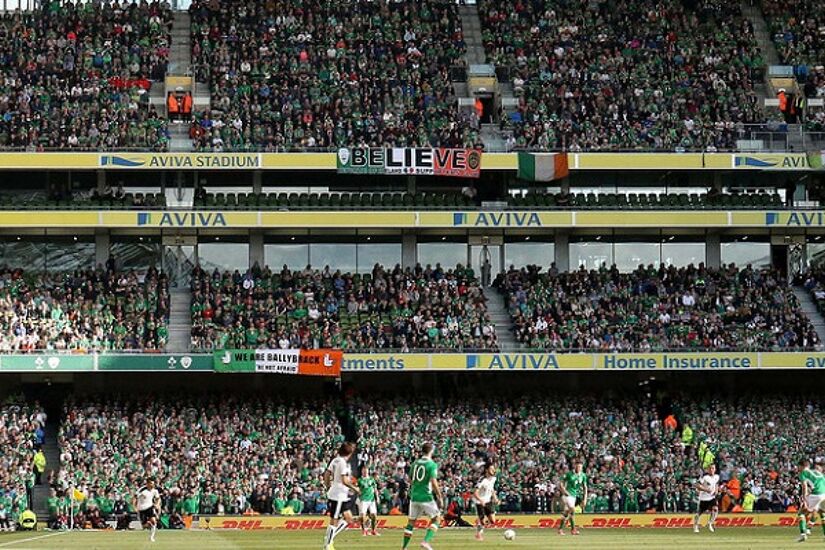Ryan Kilbane: The League of Ireland must play an important part in the future of Irish Football

Credit: Michael P Ryan (ETPhotos)
Ryan Kilbane explains why, without the League of Ireland, Irish football can simply never expect to move forward and compete with other countries in Europe.
As the dust has well and truly settled on the 5-1 hammering at the hands of Denmark in November, we are still left with the lingering feeling of ‘what next’ for Irish football. Any fleeting optimism following the Wales victory has well and truly vanished, through a combination of Ireland’s lack of a plan to retain possession meaningfully, the recent Martin O’Neill ‘will he, wont he’ drama with Stoke City and Christian Eriksen.
There were some positive results over the course of the campaign, most notably Austria and Wales away but they were generally balanced out by lacklustre matches where Ireland either looked outclassed (Serbia at home) or were unable to break down supposed weaker opposition (Georgia away). In truth this Ireland squad is not without some qualities: we concede few goals, we don’t rely on 1 or 2 star players and we have seen that they can raise their performance in a pressurised environment when a result is needed, but it is clear for even the most casual Irish supporter that this team and many of those that precede it are substandard technically.
The statistics prove this with Ireland averaging a measly 43% average possession and 77% passing accuracy over qualifying. Either people born on this island are inherently poor footballers or else our football culture or lack thereof is still affecting the national team’s performance.
It’s far more likely to be the latter, and with the start of a new League of Ireland season fast approaching its clear that the domestic game is growing with importance. It is probably too utopian to think that in the near future the league will be better supported than the English premier league but its relevance to the international team is at its highest for a generation if not two. For far too long we have been dependent on the English academy system to develop our players, a system we would be quick to scoff at every two years when England inevitably under perform at a major tournament, but yet one that still produces the lion’s share of our international squads.
The tide has begun to turn in recent campaigns with a higher percentage of former League of Ireland players being used. Seven of the match day 23 for the final group game against Wales and the two play-off games against Denmark once plied their trade on these shores. The idea however is not to crowbar current or ex-players into the national team but to use the league as a breeding ground to develop the type of player we want, thus improving the national and international game.
The introduction of the under-19s, under-17s, and under-15s leagues is a step in the right direction, albeit a late one. It provides a clear pathway for players to develop from their early teens into first teams, the industry norm in every other country but for some reason, political, traditional or other, has never existed successfully here.
We are already seeing the fruits of this with Ireland's two recent victory shield triumphs at under-16 level, remaining unbeaten in both campaigns and with a host of players from league of Ireland clubs in 2017, showing the turning of perception. We have also seen players such as Jamie McGrath and Aaron Bolger progress into Dundalk and Shamrock Rovers first teams to name but a few.
The recent poster boy for this pathway is Sean Maguire; he sampled life at the top echelon of English football when he signed for West Ham United in 2013 as a 20-year-old following a successful season with Waterford where he scored 13 goals. However after two years, and no first team appearances, he found himself back in the League of Ireland in 2015 signing for Dundalk.
His time at Dundalk was limited and he then moved to Cork where he began to flourish. Maguire showed that not every player develops at the same rate, that some players are not ready to go to England at 15 or even 20 in Maguire’s case. This is why it is pivotal that they have the tools and environment to develop here and not be lost in the system. Maguire was able to use this time to adapt into a more traditional number 9, a luxury he may not have been given in the UK.
It’s not just young Irish players who are struggling to find opportunities: the average age of championship squads for the 16/17 season was 26.3 years and in the Premier League it’s higher again at 27.3 for the 17/18 season with only 6.8% of the minutes played by academy players.
Added to that the intense physical nature of both leagues and the vast sums of money on offer and you quickly start to picture an archetypal Premier League/Championship player. Maguire himself references that in a recent interview with the Guardian where he says, “It’s very different [to the League of Ireland] in many ways. The main one is probably physically. You’re coming up against guys who are 6ft 2in and built like machines. If you take that second or third touch, they’re going to go through you.”
At the grand old age of 23 he is now more than capable of handling the demands and has since become a full international, a transition made easier having been involved in big domestic and European games over the last two years with Cork and Dundalk.
When you cross examine our recent qualifying performances and the leagues that the majority of our players play in then you start to draw conclusions as to why we find it so difficult to dominate possession even against apparent weaker opposition.
The Premier League is widely considered the best league in the world and the championship is an extremely competitive league but these are competitions where Irelands only genuine ‘number 10’ Wes Hoolahan was deemed surplus to requirements until he had already turned 25. Hoolahan is arguably Irelands most creative and technical players of the last 15 years.
Players like Robbie Keane and Damien Duff had much more successful careers and were destined to be stars since they were teenagers but neither fit the mould as a central creator, who can start attacks as well as provide final balls, something Ireland have traditionally lacked. England too traditionally don’t produce many genuine ‘number 10s’ or ‘registas’ (deep lying playmakers) and have suffered from the same fate we have.
The evidence is there for the FAI to concentrate more efforts and funding to our national league. Not just as a moral obligation for ‘the good of the game’ but to seriously improve the standard at International level. If we look at other countries around Europe with similar population bases, those with strong academy systems and leagues are consistently able to develop good quality players.
Croatia is a good example of this. With a population of 4.2 million, they have qualified for every World Cup since France 98, where they finished third, bar once in 2010. They just recently qualified for the World Cup after an emphatic 4-1 victory over Greece and boast players of the calibre of Luka Modric and Mateo Kovacic of Real Madrid and Ivan Rakitic from Barcelona.
Modric and Kovacic where both products of the Dinamo Zagreb academy. Here they were able to pick up valuable first team games before moving on to bigger clubs. Mario Mandžukic played over 155 senior games in Croatia before moving to Wolfsburg. All three players have won the Champions League in the past 5 years.
Even our old play-off foes Denmark, who we have been drawn against in the Uefa Nations League, consistently churn out better technicians than ourselves. Players such as Thomas Delaney and Yussuf Poulsen are able to play in the Danish Superliga before securing moves to teams in bigger European leagues, while their more prodigal stars such as Eriksen and Kasper Dolberg will still leave the country; it is more likely to be for Ajax than a lower to mid ranking Premier League side.
League of Ireland clubs have taken it upon themselves more in the last few years when it comes to developing young players, Shamrock Rovers have started focusing funds, which before would have been spent on first team players' wages, on building an academy in Roadstone, but the clubs and the powers above must do more. Worryingly, the most significant investment into the league in recent years has come in the form of European prize money and then this year from Peak6 – an American private equity firm who have invested in Dundalk.
It is too easy to criticise the FAI completely but when as recently as 2014 the chief executive John Delaney described the league as a “difficult child” and in 2013 the then men’s senior team manager Giovanni Trappatoni claimed “there is no league in Ireland” it shows there is a disconnect.
Delaney has changed his tune more recently, saying, “I think that collectively as a group of partners, we can bring the league to the next step. I've no doubt about that.” However, we are yet to see any monetary evidence of his apparent enthusiasm with last season champions Cork City pocketing €110,000 for winning the league in comparison to €440,000 for winning one round in the Europa league.
The League of Ireland kicks off on the 16th and 17th of February with a full round of Premier Division fixtures, including the biggest derby in the country with Shamrock Rovers travelling to Bohemians. The matches will most likely play second fiddle on the national consciousness to the English Premier League games that weekend but if the league can continue its steady progress on and off the pitch and with some added investment then there is no reason why we cannot get to a stage where we have League of Ireland clubs regularly qualifying for the Europa League and getting players called up to the international team. The ‘barstooler’/’daytripper’ culture is too ingrained in Ireland for it to ever fully leave these shores, but the league's importance in a practical sense is growing and will hopefully continue on its upward trajectory.
You may or may not attend a game on the 16th but if you do there’s a pretty good chance you will be witnessing some future Ireland internationals.
Extratime.ie will once again be here with you every step of the way through our live updates, match reports, photographs and general news pieces as our team of dedicated volunteers prepare for yet another exciting League of Ireland season.

